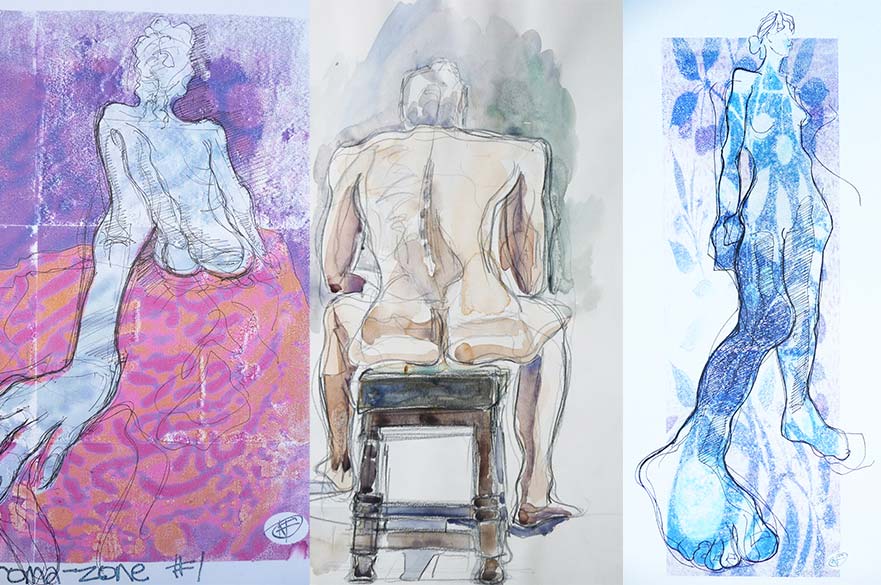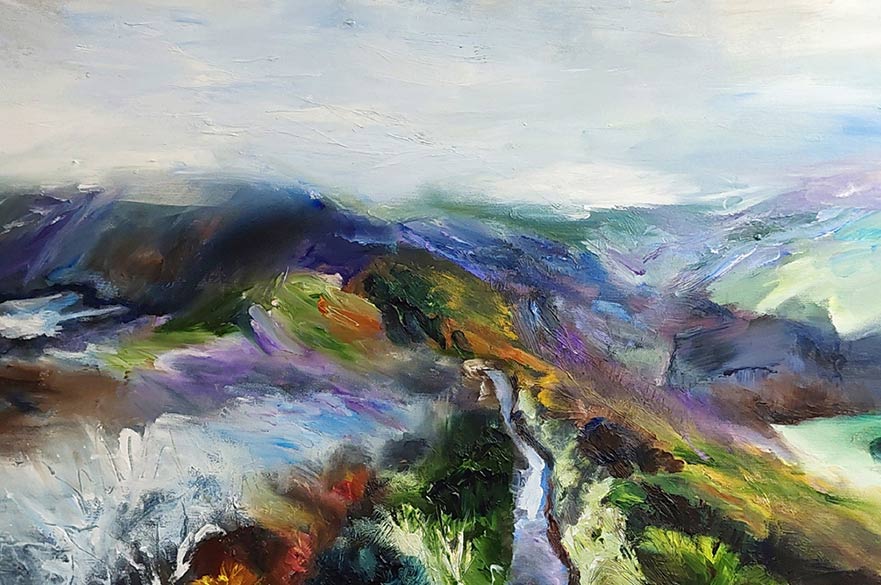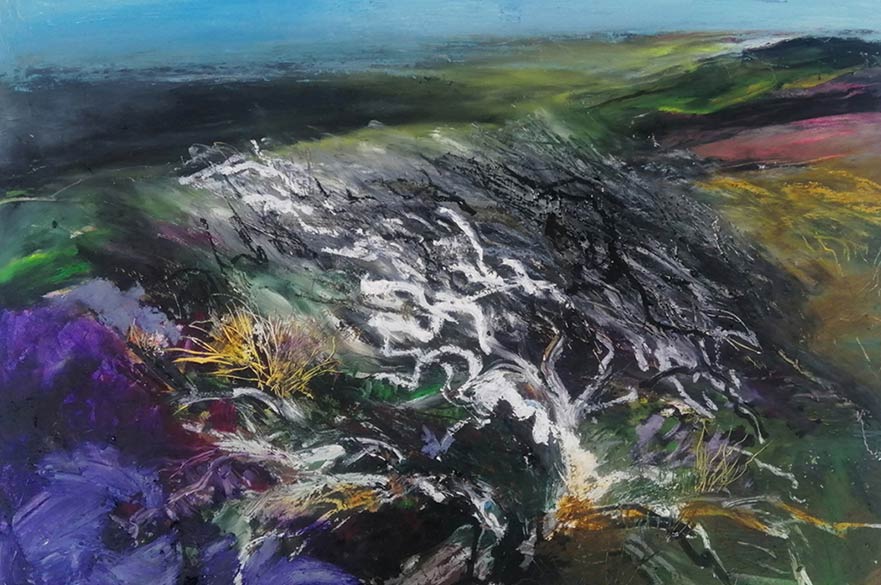Advanced Botanical Drawing and Illustration
- Level(s) of Study: Short course
- Course Fee:
£365
- Start Date(s): 11 August 2025, 18 April 2026
- Duration: Saturdays, 10 am to 4 pm, four weeks or Monday to Thursday 10 am - 4 pm, Four days
- Study Mode(s): Part-time
- Campus: City Campus
- Entry Requirements: More information
Introduction:
Course dates:
11 - 14 August 2025, Monday to Thursday 10 am - 4 pm
18 April - 9 May 2026, Saturdays 10 am - 4 pm
This course is for anyone wishing to deepen their botanical drawing practice and explore more complex techniques. Building on the foundational skills acquired in the introductory Botanical Drawing and Illustration course (and equally relevant for those who’ve attended a course elsewhere), over four intensive sessions, you will develop your ability to capture the intricate details and subtle nuances of a wide range of plant subjects with increased accuracy and artistic expression.
Continuing to use nature as our source of inspiration, this course will enable you to further develop your skills and knowledge. Completing an illustration can be a long process and the botanical artist faces a number of creative and practical challenges. During the course, these areas will be explored, with attention being given to practising a range of more advanced techniques; exercises and finished pieces of work will allow you to demonstrate a higher level of skill, application and knowledge.
You’ll complete a combination of guided exercises and personal projects, experimenting with advanced media, including coloured pencils, watercolours, and pen and ink, to achieve greater depth, texture, and realism in your work. The course will also introduce you to compositional strategies and the use of light and shadow to create dynamic, lifelike illustrations.
-
You’ll be part of a design community in our creative studio culture; one that promotes discussion and collaboration, and encourages experimentation and the constant swapping of ideas.
-
With a limited class size you'll have the one-to-one attention you need to ensure you leave with the skills to continue developing your designs at home or work.
-
Benefit from learning with an experienced tutor who has established links to the profession and significant experience working in varied practices.
-
On successful completion of the course you will receive a certificate of attendance.
What you’ll study
Working in a supportive studio environment, you’ll receive personalised feedback from your experienced tutor, who will help you refine your technique and build confidence in your unique style.
During this course, you will:
- refine your observational skills by closely studying a variety of plant forms, focusing on intricate details and textures
- experiment with different media to enhance realism and depth
- develop compositional techniques that effectively utilise light and shadows
- complete a series of advanced botanical illustrations that demonstrate your improved skills and confidence in tackling more complex subjects.
- gain insight into the historical and contemporary practices in botanical illustration, inspiring your own work and approach.
- build a portfolio of advanced botanical illustrations that showcase your artistic growth and technical proficiency.
By the end of the course, you will have completed a series of advanced botanical illustrations and have the skills to approach more challenging subjects with confidence.
You will be able to:
- demonstrate a confident approach to drawing and painting complex botanical subjects accurately
- understand and demonstrate how to represent surface pattern and texture using a range of graphite and watercolour techniques
- apply basic and more complex colour theories, colour relationships and tonal values
- demonstrate different forms of composition such as movement and balance, and the aerial perspective within the arrangement of subject matter
- exhibit botanical accuracy within the composition
- demonstrate a practical understanding of alternative mediums used.
Here’s a breakdown of what you’ll study during the course:
- Session 1: Review of Previous Drawing and Painting Challenges
- Session 2: Mastering Colour in Botanical Illustration
- Session 3: Overcoming Botanical and Textural Challenges
- Session 4: Exploring Alternative Media – Pen, Ink, and Coloured Pencil
In this session, you will reflect on the specific drawing and painting challenges you encountered in your previous botanical work, whether from a beginner’s course or other experiences. Through guided exercises, you’ll begin to tackle these challenges head-on, focusing on accurately and confidently depicting more complex botanical structures, such as intricate leaf patterns and delicate petal formations.
This session delves into the advanced colour challenges faced by botanical artists. You’ll explore how to effectively render shadows, achieve botanical blacks, and tackle dark and variegated subjects, such as leaves with multiple hues. The session will also cover techniques for using colour to create depth and perspective in your illustrations, along with understanding simultaneous colour contrast to enhance the realism and vibrancy of your work.
In this session, the focus will shift to the botanical and textural challenges inherent in botanical illustration. You’ll learn how to accurately depict a variety of textures, such as the roughness of bark, the smoothness of stems, and the intricate details of roots. Alongside this, you’ll continue developing your watercolour painting skills, with an emphasis on achieving fine detail and precision that faithfully represents the natural world.
This session introduces you to alternative media used in botanical illustration, such as pen and ink and coloured pencils, painting in gouache or watercolour on a non-white support. You’ll experiment with these materials to create detailed and textured botanical illustrations, learning how each medium can be used to achieve different effects and how they can complement your watercolour work. This exploration will expand your repertoire of techniques, allowing you to choose the most suitable medium for various botanical subjects.
How you’re taught
With a strong emphasis on practical demonstrations of techniques and individual exploration, in addition to individual support, you will develop an increased confidence in your skill set.
Some homework and preparation work will need to be undertaken before each session (approximately 1 – 2 hours per week).
This course will be delivered in person on Nottingham Trent University city campus.
Contact hours
You will receive 20 contact hours of quality tuition with an experienced tutor.
Careers and employability
The course is designed to help you master advanced botanical illustration techniques, from creating detailed, lifelike compositions to understanding the standards required for professional scientific and artistic work in the field. Students who have taken this course have come from a wide variety of industries including garden and landscape design, floristry, environmental and ecological businesses, fine art, or software and gaming design.
On successful completion of the course you will receive a certificate of attendance, which will further enhance your CV.
Campus and facilities
You will be based in the School of Art and Design on the City Campus.
You'll find bright drawing and painting studio and workshop spaces to develop your ideas and create exciting work.
You’ll also have access to our library to use outside of your short course; whilst you can’t reserve or take away books, you are welcome to use them as a resource for research and referencing.
You will receive an email one week before the course starts with joining instructions on where to go for the first day.
Entry requirements
Level: Improvers
Entry requirement: This course is ideal for those who have completed a beginner’s course in Botanical Drawing and Illustration at NTU or elsewhere, or have equivalent experience and wish to continue developing their practice. Experience of drawing and watercolour painting is essential.
You must be over the age of 18 in order to attend this course.
Fees and funding
The fee for this course is £365.
Payment is due at the time of booking - ask us if you'd prefer an invoice sent to your company.
Secure your place with a deposit - If you're booking more than two months before the course starts, we can accept a £200 deposit to secure your place, and the balance is due one month before the course starts.
Your course fees cover the cost of studies, including great benefits such as the use of our modern library and free use of the IT equipment and software on the campus during your course.
What to Bring
You'll also need to bring the materials listed below. Items marked with an * are ones you likely already have if you attended the beginner’s course at NTU.
- A3 sketchbook. An ideal sketchbook would be Stillman & Birn Zeta series or the Daler Rowney Ebony spiral bound sketchbooks (they handle light colour washes better than other options) - the paper should be as white and smooth as possible. *
- Graphite pencils, such as Faber Castell 9000 or Staedtler Lumograph, grades 4H, 2H, F or HB, B, 2B. *
- Sable or synthetic pointed round paint brushes (these are good for laying down washes and detailed work). We’d suggest getting the following sizes: Size 6, Size 4, Size 2, Size 0. *
- A Paint palette – either a daisy ceramic palette or a white household china side plate. *
- Hand-held Magnifying Lens x2 magnification. *
- Travel lamp with daylight bulb. *
- Watercolour paints – you will need all of the following paints from Winsor & Newton:
- Reds: Permanent Rose, Quinacridone Red or scarlet Lake, Permanent Alizarin Crimson, Perylene Maroon
- Yellows: Winsor Lemon, Transparent Yellow, Indian Yellow, Transparent Orange
- Blues: Winsor Blue Green Shade, Winsor Blue Red Shade, Cobalt Blue, Indanthrene Blue
- Violets: Winsor Violet Dioxazine, Perylene Violet, Quinacridone Magenta
- Greens: Perylene Green, Viridian
- White Gouache
Your tutor will provide watercolour paper at the start of the course, to get you going.
You will need to provide paper as the course progresses, and your tutor can advise you on the most suitable paper to get during the first session.
If you would like to do some pre-course research, you can look at:
- Botanical Art Techniques by The American Society of Botanical Artists
- Botanical Illustration by Valerie Oxley
- Botanical Illustration From Life by Isik Güner
- Website: https://www.botanicalartandartists.com/
You can read the terms and conditions of booking here.
Need accommodation for a week long summer course?
Accommodation can be booked separately to the course; the rooms are only a few minutes’ walk from our studios and classrooms, and cost £259 per week.
These are single rooms with a private bathroom in shared apartments in Nottingham Trent University’s city campus accommodation, which is ideal if you're looking to be based in Nottingham's lively city centre and want an economical place to stay.
Find out more and book your accommodation here.
How to apply
You can book your place via the NTU online store:
11 - 14 August 2025, Monday to Thursday 10 am - 4 pm
18 April - 9 May 2026, Saturdays 10 am - 4 pm
Browse all our short courses in fine art.
Any questions?
Contact the short course team:
Email: creativeshortcourses@ntu.ac.uk
Tel: +44 (0)115 848 2813


